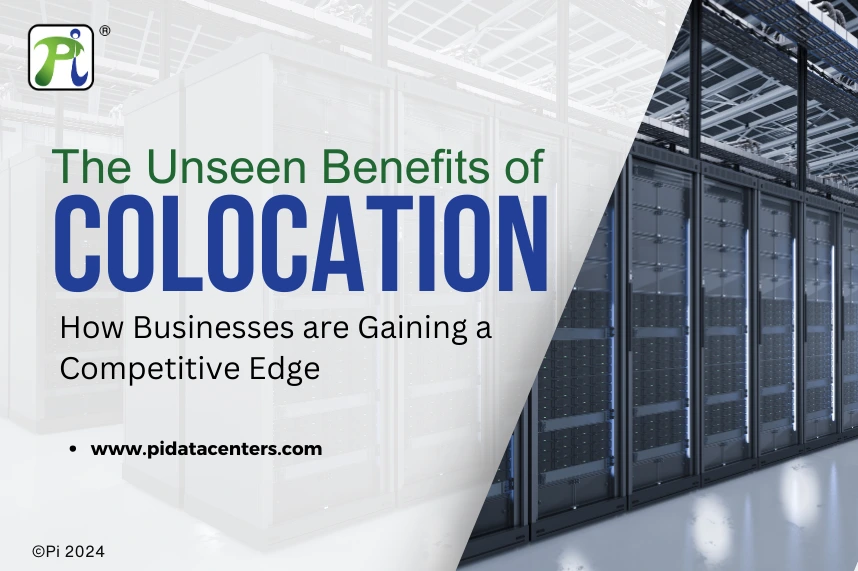We Will Get Back To You As Soon As Possible


In today's lightning-fast world, where everything must be done in one swipe, the reliability of IT infrastructure is paramount, regardless of business size. Unexpected disruptions, such as natural disasters, cyberattacks, or system failures, can devastate operations, leading to significant loss of brand credibility, data loss, and financial damage.
Businesses often need more skilled resources to manage their IT infrastructure, irrespective of the nature of their business. Protecting data and keeping operations running is paramount, and it's not just a good idea; it's a necessity. In the IT infrastructure world, there is a term or option called Colocation.
Colocation (or colo) refers to the practice of housing privately owned servers and networking equipment in a third-party data center. Organizations rent space within a colocation facility instead of maintaining their own data center. This option provides a highly secure, reliable environment with robust power, cooling, and network connectivity, ensuring that IT systems remain operational and always accessible.
Colocation is crucial in modern IT infrastructure, particularly for businesses looking for flexibility, scalability, and cost efficiency in managing their IT resources. It has also become a good option for improving disaster recovery (DR) and business continuity planning (BCP). They help businesses protect their data cost-effectively and efficiently.
As explained above, this is a brief about Colocation and its ability to provide access to secure, reliable, and scalable infrastructure, which is critical for maintaining business continuity in the face of disruptions.
Colocation houses your IT infrastructure—servers, storage, and networking equipment—in a third-party data center. Instead of maintaining an in-house data center, businesses rent space in a facility that offers secure, reliable, and scalable infrastructure. This arrangement allows companies to focus on core operations while benefiting from colocation providers' expertise and advanced technologies. Colocation is particularly advantageous for businesses that wants to eliminate the need for significant capital expenditure for building and maintaining a vast in-house IT Infrastructure.
Colocation facilities typically offer state-of-the-art infrastructure, including redundant power supplies, cooling systems, and high-speed internet connectivity.
These features ensure your IT systems remain operational during power outages or other disruptions. Additionally, colocation providers often offer 24/7 monitoring and support, which means that any issues with your infrastructure can be addressed immediately, minimizing downtime.
The ability to safeguard data without the hefty investment associated with on-premises IT Infrastructure or Data Center is a fabulous feature of Colocation. Businesses should consider Colocation for its ability to provide secure, scalable, and cost-effective IT infrastructure without the overhead of managing a private data center. Colocation offers access to enterprise-grade facilities, ensuring high availability with redundant power, cooling, and connectivity. It also allows companies to maintain control over their hardware while benefiting from enhanced security and disaster recovery solutions. It is a flexible option for supporting growth, hybrid cloud strategies, and mission-critical workloads.
Another critical advantage of Colocation for small businesses is scalability. As your business grows, your IT needs will also evolve. Colocation facilities allow you to scale your infrastructure up or down as needed without significant upfront investments. This flexibility is precious for small businesses that may require more resources to invest in large-scale IT infrastructure from the outset. With Colocation, you can start small and expand your footprint as your business demands increase.
Colocation facilities are designed with disaster recovery in mind, offering multiple layers of redundancy and failover capabilities. These facilities are often located in geographically diverse regions, reducing the risk of simultaneous disruptions. For small businesses, this means that even during a local disaster, their data stays safe, and they can keep working. Furthermore, colocation providers often offer additional services, such as data backup and replication, critical for a comprehensive disaster recovery plan.
In addition to physical security, colocation facilities also offer robust cybersecurity measures. These measures include firewalls, intrusion detection systems, and regular security audits. You can use advanced security features by placing your IT infrastructure in a colocation facility. This helps lower the risk of data breaches and cyberattacks. This level of protection is especially important for small businesses that may need more resources to implement such comprehensive security measures on their own.
Here are the key features and benefits of Colocation:
In short, Colocation offers a flexible and cost-effective way for businesses to maintain control over their hardware while benefiting from the high-performance environment of a professional data center.
After considering the benefits of Colocation, it's essential to focus on how this solution strengthens crucial elements of IT infrastructure like disaster recovery, business continuity, and other vital operations. Colocation facilities enhance these areas and provide a foundation for robust, scalable, and secure IT environments. Here's a deeper dive into those elements:
Colocation is critical for disaster recovery strategies because data centers are designed with redundancy across power, cooling, and network infrastructure. Many colocation providers offer dedicated disaster recovery services, including backup power generators, redundant internet connections, and offsite backup capabilities. This ensures that in the event of a disaster at your primary site, your IT infrastructure can remain operational from the colocation facility, minimizing downtime and protecting data integrity.
With Colocation, businesses can maintain operational continuity during unexpected events like power outages, natural disasters, or even hardware failures. The robust uptime guarantees provided by colocation centers, typically around 99.999%, ensure that critical business applications are available without interruption. Additionally, colocation providers often offer multi-site replication, ensuring that even in the worst-case scenario, business-critical data and applications can quickly failover to backup systems, maintaining seamless operations.
Colocation facilities typically offer advanced physical security measures, such as biometric access controls, video surveillance, and 24/7 monitoring, ensuring the physical protection of hardware. For industries with stringent compliance requirements (e.g., healthcare, finance), colocation centers often provide certification for compliance standards like ISO 27001, HIPAA, SOC 2, and PCI-DSS, allowing businesses to meet regulatory demands without building their compliant infrastructure.
Colocation provides a flexible environment to scale IT operations as businesses grow. Whether you need more rack space, higher bandwidth, or additional power, colocation centers can accommodate growth without requiring massive capital investments. Businesses can also adjust their resources based on seasonal demand or technological upgrades.
Many colocation data centers are carrier-neutral, offering connections to multiple internet service providers (ISPs) and cloud providers. This allows businesses to leverage the best network connections for performance and cost. Direct connections to major cloud platforms like AWS, Azure, and Google Cloud also facilitate hybrid cloud strategies.

Selecting the right colocation partner is critical to realizing the full benefits of Colocation. Businesses should evaluate the following parameters before making a decision:
Choose a colocation facility close enough to your primary site for easy access but also far enough to provide redundancy in a regional disaster. A secondary location in a geographically diverse region for disaster recovery can add resilience.
Check the provider's Service Level Agreements (SLAs) for uptime guarantees. A Tier III or IV data center typically guarantees 99.982% and 99.995% uptime, respectively. Ensure the colocation provider has vital uptime records and redundancy features for power, cooling, and networking.
Verify if the colocation provider can scale along with your business. This includes adding more rack space, power, bandwidth, or connections to cloud providers as needed. The provider should offer flexible options that align with your growth plans.
Ensure the provider offers robust disaster recovery solutions such as data replication, failover systems, and geographic diversity. They should also provide resilient power systems with backup generators and UPS to maintain operations during outages.
Look for carrier-neutral facilities that provide a range of ISP options to optimize costs and performance. Also, check if they offer low-latency connections to cloud providers for hybrid or multi-cloud strategies.
Evaluate the provider's physical and cybersecurity infrastructure. Are they offering multi-factor authentication, 24/7 monitoring, and surveillance? Also, assess whether they meet compliance standards relevant to your industry, like ISO, HIPAA, or SOC 2.
Review the cost structure carefully to ensure it aligns with your financial model. Understand the pricing for rack space, power usage, network bandwidth, and additional services like remote hands, backups, or security monitoring.
Assess the quality of customer support, including the availability of remote hands services for on-site troubleshooting. Ensure the colocation partner offers 24/7 support and a dedicated account manager for addressing issues promptly.
Check for efficient cooling systems, temperature controls, and energy consumption strategies. These features are essential to keeping your equipment running optimally while managing operational costs.
Pi Datacenters is a robust colocation partner for businesses due to its comprehensive range of services, advanced infrastructure, and customer-centric approach. Here's why Pi could be the right choice, along with its unique selling propositions (USPs):
Pi Datacenters operates Tier IV data centers, ensuring the highest reliability and uptime (99.995%). These facilities are built to eliminate single points of failure, providing the resilience required for mission-critical applications and continuous operations.
Located in Vijayawada, Kochi, Mumbai, and Hyderabad, India, Pi offers strategic facilities far from significant fault lines or disaster-prone areas, ensuring superior disaster recovery and business continuity. Its location also reduces latency for businesses across South Asia and the APAC region.
Pi Datacenters is a carrier-neutral facility, allowing businesses to connect with multiple telecom and internet service providers (ISPs) based on their performance, redundancy, and cost. This enables companies to build custom networking solutions that optimize performance and minimize downtime.
Pi offers best-in-class disaster recovery (DR) and business continuity services, with geographically distributed data centers that facilitate data replication and failover capabilities. This ensures businesses can continue operations during a disaster, making it an ideal choice for enterprises prioritizing high availability.
Pi's colocation services include advanced security protocols, including 24/7 surveillance, biometric access controls, and multi-layered firewalls. Furthermore, Pi is compliant with several industry certifications, such as ISO 27001, SOC 2, and PCI-DSS, ensuring that businesses meet regulatory standards in sectors like finance, healthcare, and retail.
Pi Datacenters facilitates hybrid IT environments by providing seamless integration with cloud providers. Businesses can connect their on-premise systems hosted at Pi with cloud platforms like AWS, Microsoft Azure, and Google Cloud, allowing them to adopt a hybrid or multi-cloud strategy.
Pi's colocation services are designed to scale with your business needs. Whether you need additional racks, enhanced connectivity, or more power, Pi offers customizable solutions that can be tailored to specific IT requirements. This flexibility supports growing enterprises as well as large-scale IT operations.
Pi Datacenters are built with a focus on sustainability, employing energy-efficient cooling systems and power management strategies. This commitment to reducing the carbon footprint appeals to environmentally conscious businesses that are prioritizing sustainability in their IT operations.
Pi offers Colocation and a range of managed services, including data backup, disaster recovery, firewall-as-a-service, and load balancer-as-a-service. This ensures businesses have access to complete IT solutions under one roof, simplifying management and reducing operational complexity.
By offering OPEX-based pricing models, Pi enables businesses to reduce capital expenditure while gaining access to world-class data center infrastructure. This flexible pricing model supports both small businesses and large enterprises manage costs effectively.
Pi Datacenters can be your ideal colocation partner due to its world-class infrastructure, carrier neutrality, high availability, robust disaster recovery capabilities, and comprehensive managed services. Its unique combination of security, scalability, and sustainability, combined with seamless cloud integration, makes Pi a trusted partner for businesses across various industries looking to future-proof their IT infrastructure.
By carefully considering these factors, businesses can choose a colocation partner that supports current IT needs and offers the flexibility, security, and performance needed for future growth and innovation.
Questions? We're here to help.
©2026 Pi DATACENTERS® Pvt. Ltd. All rights reserved
